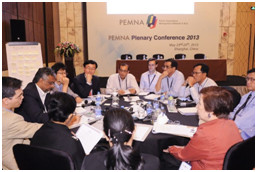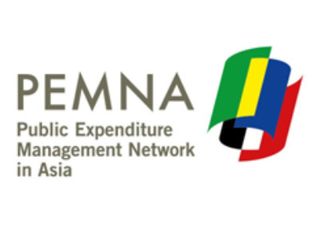Posted by Miki Matsuura, Shabih Ali Mohib, Catherine Yang[1]
That is why the World Bank, the Korean Ministry of Strategy and Finance and AusAID established the Public Expenditure Management Network in Asia (PEMNA)[2] in 2012. The 13 member countries comprise Cambodia, China, Indonesia, Korea, Lao PDR, Malaysia, Mongolia, Myanmar, Philippines, Singapore, Thailand, Timor-Leste, and Vietnam. A peer-learning network of public expenditure management (PEM) practitioners,PEMNA provides a forum for public officials working in PEM across the East Asia and Pacific region to share professional knowledge and experience. PEMNA is demand-driven; the member countries themselves identify issues they want to address and provide mutual advice.
PEMNA’s goal is to create a sustainable network in which knowledge gained by individual countries contributes to the improvement of member country PEM systems. Specifically, PEMNA facilitates the exchange of experiences on high-priority PEM reforms, analysis of common challenges in the East Asia and Pacific region, and benchmarking of PEM performance across member countries. The work of the network is supported by a coalition of development partners, including the World Bank, the Korean Ministry of Strategy and Finance, and the IMF. PEMNA follows the successful model set by the Public Expenditure Management Peer-Assisted Learning network (PEMPAL), a group of Eastern Europe and Central Asian countries that was established in 2005.
PEMNA is managed by a Steering Committee, comprising representatives from each member country and the development partners. The Steering Committee provides overall guidance on PEMNA’s governance structure, operational rules, work plans and budget. PEMNA is divided into two Communities of Practice (CoPs), on budget and treasury issues respectively, guided by Leadership Teams comprising volunteers from member countries. Issues discussed in each CoP reflect the interests and preferences of the member countries. The Budget CoP (B-CoP), for example, focuses on the relationship between planning, budgeting and fiscal risk management, and the Treasury CoP (T-CoP) on the functions and organization of the treasury, cash management, and financial management information systems (see table below). Both CoPs are also engaged in high-quality research projects on these topics. The CoPs arrange exchanges between members through workshops, study visits, research projects, videoconferences, online interactions, an internet-based knowledge repository (www.pemna.org), selective use of outside technical expertise, and other mechanisms. A plenary conference for the member countries is held every year.
A Secretariat, based at the Korea Institute of Public Finance (KIPF) in Seoul, supports the Steering Committee, CoPs, and the Leadership Teams. The Secretariat handles the administrative and logistical work for network activities, including coordination with member country delegations, arranging travel, managing the PEMNA budget, and performing evaluations of PEMNA events. The Secretariat also provides technical research support, according to the demands of the CoPs.
In just over two years, PEMNA already has grown into an active, vibrant community of peers. Strong relationships have already been built among the member countries. Regular meetings of the group have contributed to this success. These include the three annual plenary meetings hosted by the government of Korea (2012), China (2013), and Mongolia (2014), and six individual CoP meetings hosted by member countries governments. This summer, the government of Vietnam sent a delegation to Mongolia to learn more about that country’s financial management information system. “PEMNA has utmost importance and value for the reason that it provides us with the opportunities to discuss and share practical experiences, progress and challenges that the countries have encountered while implementing the public financial sector reform policies” commented Mr. Gantsogt Khurelbaatar, the State Secretary of Mongolia, at the 2014 plenary meeting in Mongolia.
As PEMNA’s member countries come together, learn about each other’s PEM systems, and engage in dialogue on the challenges they share, countries from across the East Asia and Pacific region are discovering similarities and synergies they never knew existed.
PEMNA Meetings and Topics (2013-2015)
Budget CoP (B-CoP) Topics | Treasury CoP (T-CoP) Topics |
|
|
[1] Miki Matsuura is a Public Sector Management Specialist, World Bank; Shabih Ali Mohib is Program Leader, Southeast Asia Country Management Unit, World Bank; and Catherine Yang is the PEMNA Communications Advisor.
[2] Details on www.pemna.org and www.facebook.com/pemnasec
Note: The posts on the IMF PFM Blog should not be reported as representing the views of the IMF. The views expressed are those of the authors and do not necessarily represent those of the IMF or IMF policy.







